
The Emipesa Arocs trucks ensure that the roads of Aragón are safe to drive on
Profitability and logistics
The Emipesa Arocs trucks ensure that the roads of Aragón can still be used during the winter. But the company also has experience in other domains, too.
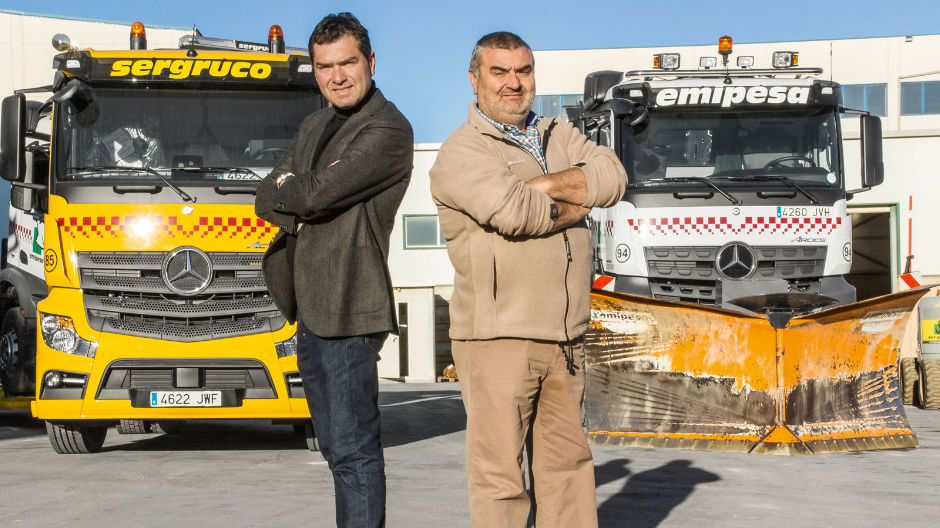
Joint strategy. The companies Sergruco and Emipesa run by brothers Miguel (left) and Carlos Pérez respectively work in close collaboration.
The last snowstorm left the A 23 closed. This arterial route which links Zaragoza with Valencia was shut along a 15-kilometre stretch around Barracas in both directions. Salvador Guillén, driver of one of the Emipesa snowploughs, has been working closely for three days with his Arocs, trying to make driving on this stretch of the motorway safe again: while the front-mounted plough uninterruptedly removes snow from the roadway, the rear-mounted spreader distributes salt and a saline solution in order to hinder the formation of new ice.
“Road maintenance during the winter season is a big responsibility,” explains Carlos Pérez, Managing Director of Emipesa. The company has been active in this domain since 2010. Back then, Carlos Pérez thought pragmatically and with entrepreneurial instinct to expand the field of operations of the company, which had previously been working in quarrying operations and the transportation of building materials in the Teruel province. Besides their ten snowploughs fitted to Arocs trucks, the company also has three industrial loaders with tracks and a 2.5-metre-wide snow cutter which can be used when the amount of snow or snow drifts require it.
How harsh the winter is in Aragón is clearly visible from the resources which the Ministry for Infrastructure and Traffic provided in the 2016/2017 winter season: 122 snow clearers; 29 stowage facilities for de-icing agents and 77 silos with an overall capacity of 21,440 tonnes of salt; 19 production facilities and 33 warehouses with a total capacity of 860,000 litres of salt solution; 79 weather stations for analysing weather data and 11 canons for fighting avalanches. In Winter, Teruel sees temperatures as low as –18 ºC. On the roads in some places, there is as much as 60 cm of snow.
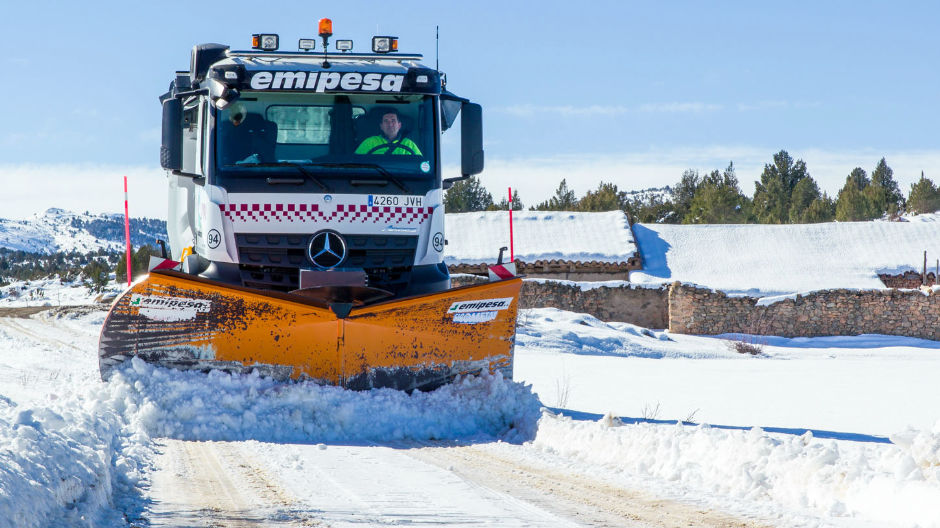
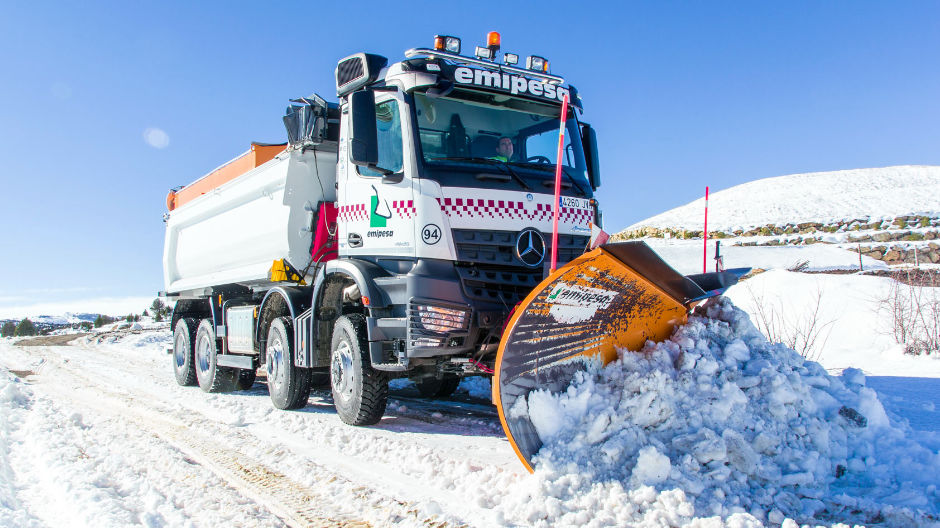
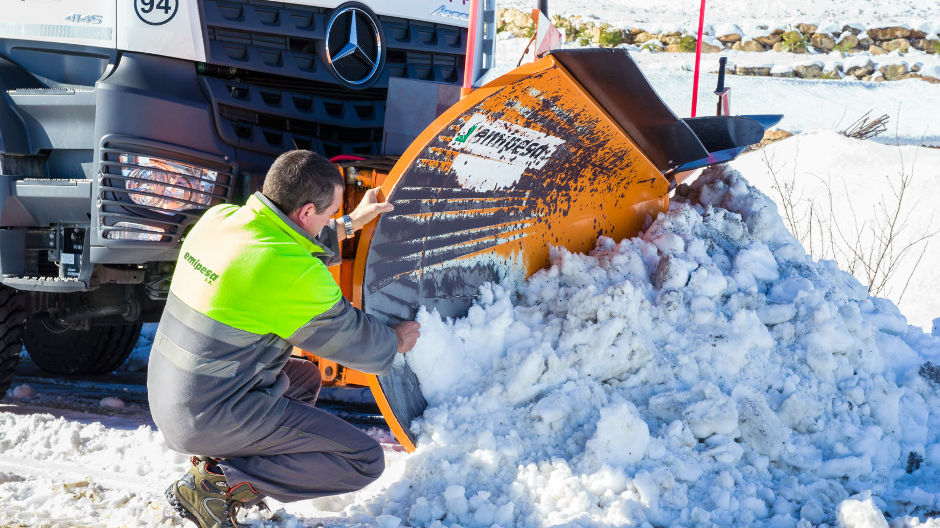
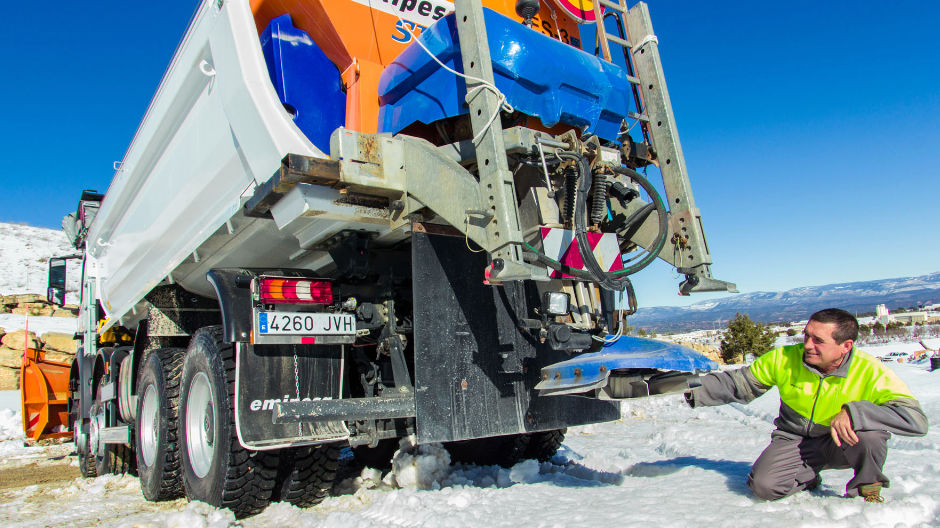
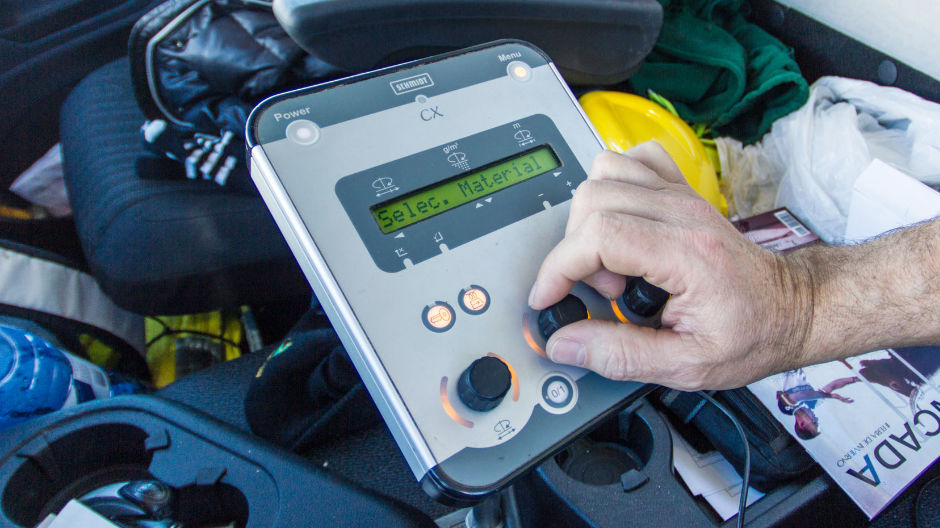
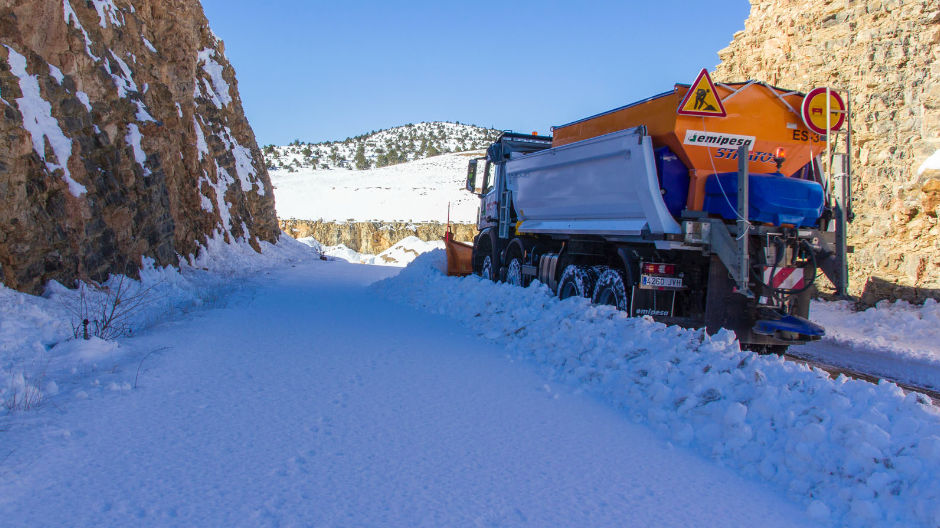
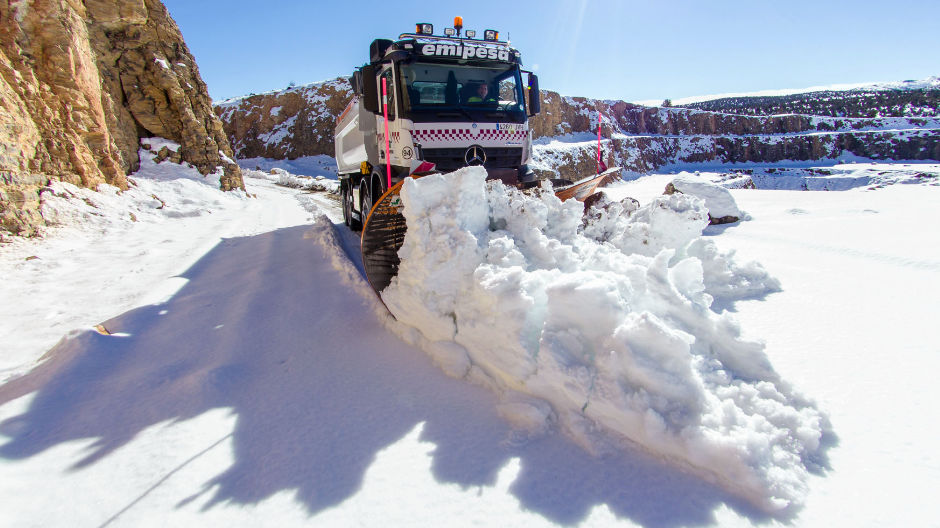
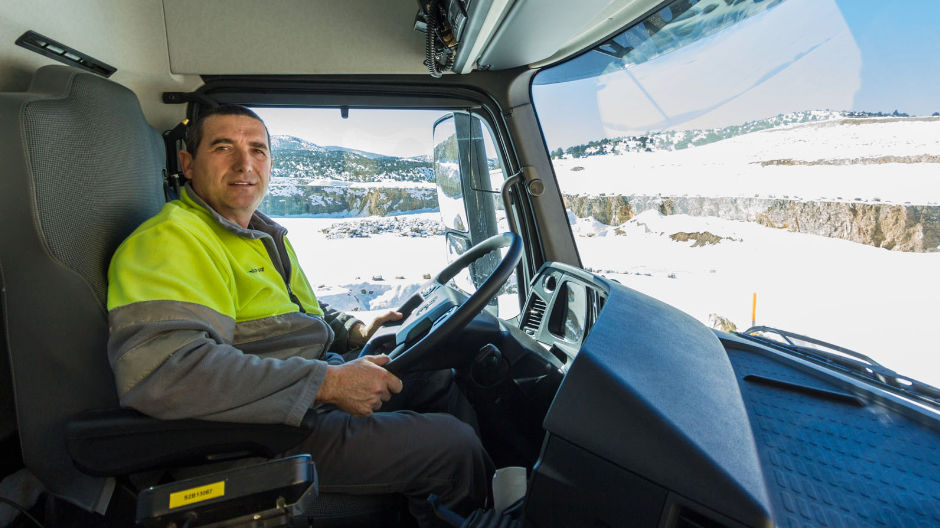
“As soon as the winter season is over, the ten Arocs trucks are freed of their snowploughs and return back to the quarries or are used for transporting concrete.”
– Carlos Pérez, Managing Director of
Emipesa
The employees at Emipesa know how important it is that the motorways, arterial routes and out-of-town roads are able to be driven on: it's a matter of life or death. Among the most commonly used routes covered by Salvador Guillén are the access routes to the ski slopes in Javalambre and Valdelinares, whose car parks are situated at 2000 m altitude. The specialist explains that the operation of the snowplough requires not only great dexterity but also plenty of experience.
On unsurfaced terrain or roads in a poor condition, it can eat
itself into the ground and get stuck, create a leverage effect and
cause an accident. Salvador explains that the speed has to be varied
depending on the type and quantity of the snow, as well as in relation
to the weather conditions: on the high-speed arterial routes, the
snowplough is restricted to a top speed of 60 km/h.
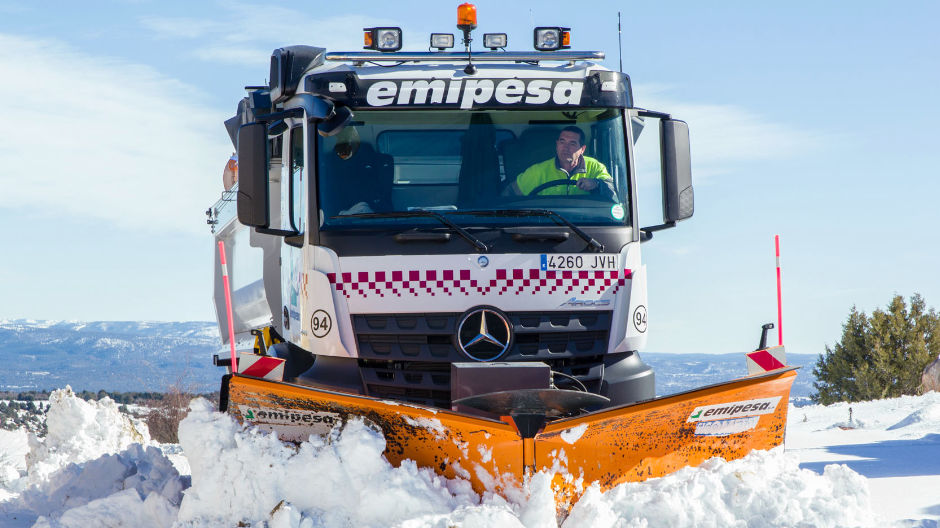
The Ministry for Infrastructure and Traffic had 122 snowploughs available to clear the roads of Aragón last year.
A device inside the cab allows Salvador to control the amount of grammes of salt or salt solution spread per square metre. He also confirms that a driver's worst enemy on the road is ice. Here, the Arocs with its excellent front-wheel drive is his trusty companion.
Usually, the winter season lasts from November to April. During these months, the company doesn't just provide its services in Teruel, but also in Castellón, Valencia and Guadalajara. “As soon as the winter season is over, the ten Arocs trucks are freed of their snowploughs and return back to the quarries or are used for transporting concrete,” explains Carlos Pérez. In all, his fleet is made up of 55 trucks, of which almost all are from Mercedes-Benz. The reason behind that is simple: “These are vehicles which can offer us a long service life. That's a decisive criteria for us,” he affirms.
The trucks are used for all areas of the business. In particular in the quarry as well as for transport tasks to construction sites and for transporting tarmac – one of the core business areas of Emipesa, which owns five quarries. In one of them, gravel is extracted for Spain's ADIF railway infrastructure management agency. This material was recently provided for the construction and maintenance of two of the most important construction sites of the autonomous regions of Valencia and Aragón: the Mediterranean Corridor and the high-speed railway line between Madrid and Barcelona. What's more, the company was also part of deliveries of asphalt and concrete for the car park at Teruel airport as well as the subsequent expansion of the airport's facilities.
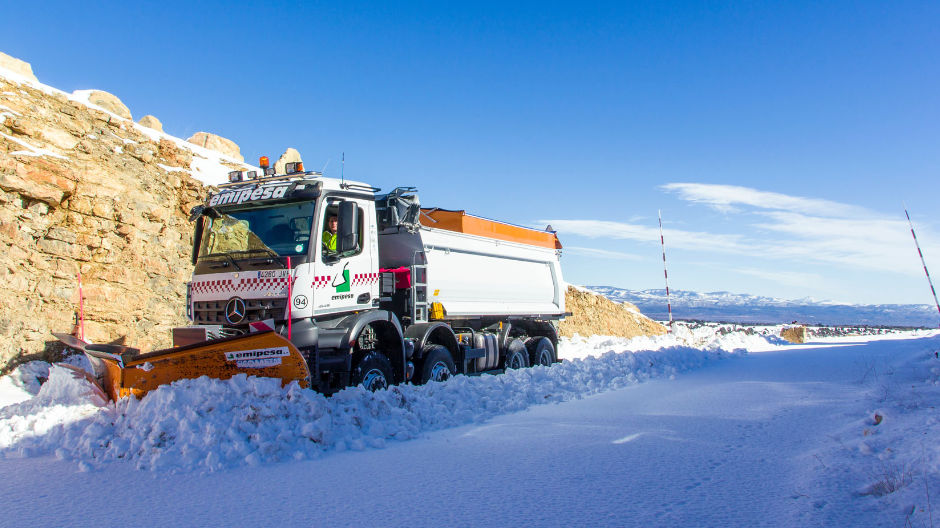
Emipesa is supplemented by its affiliate Sergruco, which specialises in industrial cranes and hoist systems for road-going vehicles as well as construction site machinery rentals. This additional branch is headed up by Miguel Pérez, Carlos Pérez's brother. Sergruco is also part of helping keep roads safe to drive on during the winter months and rents out machines with or without a driver. To this end, the company has two snowploughs which are mounted to Arocs trucks.
Just like snow flakes, Emipesa and Sergruco grow symmetrically. The
follow similar but not identical aims. Carlos Pérez summarises: “No
two snowflakes are alike”.
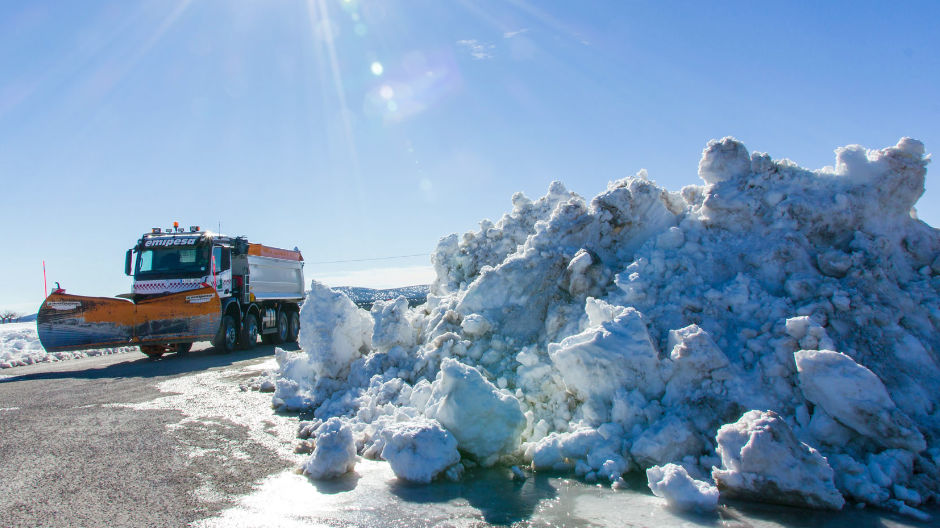
Tough operations. The Arocs with snowplough is the best choice for Emipesa when it comes to keeping roads safe to drive on during the winter.
Photos: Begoña Tremps




Comment
Please log in to post a comment.
4 comments
👍👍👍👍👍⛟😎
👍👍👍👍👍⛟😎
Gruss Richard
Gruss Richard